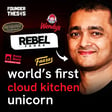
The Fearless Explorer | Bijai Jayarajan @ Houm
“I was never governed by fear” - Bijai Jayarajan
From being a young small town boy in South India to building a Multi Million Dollar company, Bijai Jayarajan is truly a fearless entrepreneur. Bijai founded Loyalty Rewardz in 2008. In his 10 year stint he raised venture capital investment to the tune of USD 26 Million & in 2017 Loyalty Rewardz was acquired for a whopping USD 100 Million!
By the time Bijai exited the company Loyalty Rewardz was managing loyalty programs for 73% of all debit cards issued in India & was processing over 200 Million transactions a month.
On a new adventure with Houm, an innovative digital product that will empower internet users to create a digital safe space - A digital home on the internet that will in a true sense ensure the privacy of our data, Bijai is once again on another fearless mission.
On this episode of Founder Thesis, catch us in a candid conversation with Bijai to know more about his inspiring journey of entrepreneurial adventures. Our biggest takeaway from our chat with Bijai was that we must chase our passions fearlessly.



















